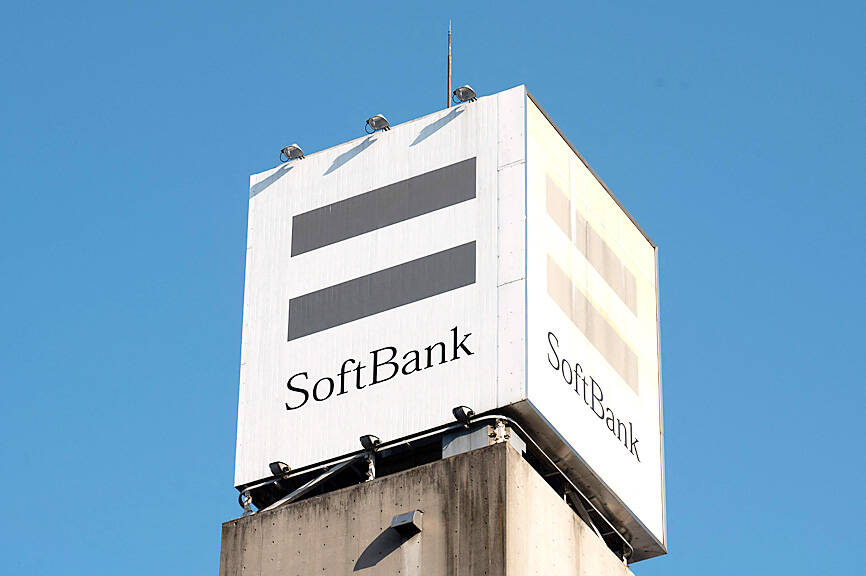As the British government’s hopes for homegrown chip giant Arm Ltd to list in London dim, local investors might still be able to own a slice of the Cambridge, England-based firm.
Even if Arm picks the US for an initial public offering (IPO), the British public could buy shares in the chip designer through a retail offer, according to PrimaryBid Ltd, a firm that specializes in such offers.
PrimaryBid has presented the idea to government ministers, having previously organized a similar arrangement alongside the US listing of the owner of luxury members’ clubs Soho House Ltd in 2021.

Photo: AFP
“UK retail investors want and deserve access to Arm’s IPO,” PrimaryBid chief executive officer Anand Sambasivan said. “A London listing would be ideal, but there’s no reason the British public should miss out.”
Arm and the British Treasury declined to comment.
A representative for Softbank Group Corp did not respond to a request for comment.
Arm owner Softbank — which is also PrimaryBid’s largest shareholder — intends to put the unit back on the market and was in March last year targeting a valuation of at least US$60 billion.
Arm is central to the chip industry with its processor designs powering about 95 percent of mobile devices, its Web site said.
British Prime Minister Rishi Sunak, who last month spoke with Arm CEO Rene Haas and Softbank founder Masayoshi Son, has been lobbying for an Arm listing in London and the US, the Financial Times reported.
That effort has focused on making the case for a dual primary listing — a boost for the City of London’s post-Brexit ambitions.
That would give Arm access to London Stock Exchange indices, boosting liquidity in its shares, but Son has said his focus is to take Arm public in the US because of its deep investor base and attractive valuations.
The process has been delayed due to uncertainty in global markets.
The PrimaryBid proposal could leave the UK with the consolation prize of a retail offer alongside a US listing. It could also help promote a government push to attract people’s savings into tech companies with an aim of boosting their returns and helping growth sectors.
A full UK listing of Arm would be a “major coup,” said Steven Fine, chief executive officer of City of London broker Peel Hunt.
Whatever the final plan, “we also believe there would be significant retail demand,” he said.
PrimaryBid estimates there could be £3 billion (US$3.7 billion) of demand from ordinary investors in Arm, which had a substantial following among private investors when it was previously listed in the UK.
Even if PrimaryBid’s pitch comes off, there remains plenty to do to repair the UK’s international reputation as open for business after Brexit, former Confederation of British Industry president Paul Drechsler said.
“Everyone used to want to come in from students to old people,” he said. “Now where are we?”

STEEP DECLINE: Yesterday’s drop was the third-steepest in its history, the steepest being Monday’s drop in the wake of the tariff announcement on Wednesday last week Taiwanese stocks continued their heavy sell-off yesterday, as concerns over US tariffs and unwinding of leveraged bets weighed on the market. The benchmark TAIEX plunged 1,068.19 points, or 5.79 percent, to 17,391.76, notching the biggest drop among Asian peers as it hit a 15-month low. The decline came even after the government on late Tuesday authorized the NT$500 billion (US$15.2 billion) National Stabilization Fund (國安基金) to step in to buoy the market amid investors’ worries over tariffs imposed by US President Donald Trump. Yesterday’s decline was the third-steepest in its history, trailing only the declines of 2,065.87 points on Monday and

TAKING STOCK: A Taiwanese cookware firm in Vietnam urged customers to assess inventory or place orders early so shipments can reach the US while tariffs are paused Taiwanese businesses in Vietnam are exploring alternatives after the White House imposed a 46 percent import duty on Vietnamese goods, following US President Donald Trump’s announcement of “reciprocal” tariffs on the US’ trading partners. Lo Shih-liang (羅世良), chairman of Brico Industry Co (裕茂工業), a Taiwanese company that manufactures cast iron cookware and stove components in Vietnam, said that more than 40 percent of his business was tied to the US market, describing the constant US policy shifts as an emotional roller coaster. “I work during the day and stay up all night watching the news. I’ve been following US news until 3am

Six years ago, LVMH’s billionaire CEO Bernard Arnault and US President Donald Trump cut the blue ribbon on a factory in rural Texas that would make designer handbags for Louis Vuitton, one of the world’s best-known luxury brands. However, since the high-profile opening, the factory has faced a host of problems limiting production, 11 former Louis Vuitton employees said. The site has consistently ranked among the worst-performing for Louis Vuitton globally, “significantly” underperforming other facilities, said three former Louis Vuitton workers and a senior industry source, who cited internal rankings shared with staff. The plant’s problems — which have not

TARIFF CONCERNS: The chipmaker cited global uncertainty from US tariffs and a weakening economic outlook, but said its Singapore expansion remains on track Vanguard International Semiconductor Corp (世界先進), a foundry service provider specializing in producing power management and display driver chips, yesterday withdrew its full-year revenue projection of moderate growth for this year, as escalating US tariff tensions raised uncertainty and concern about a potential economic recession. The Hsinchu-based chipmaker in February said revenues this year would grow mildly from last year based on improving supply chain inventory levels and market demand. At the time, it also anticipated gradual quarter revenue growth. However, the US’ sweeping tariff policy has upended the industry’s supply chains and weakened economic prospects for the world economy, it said. “Now